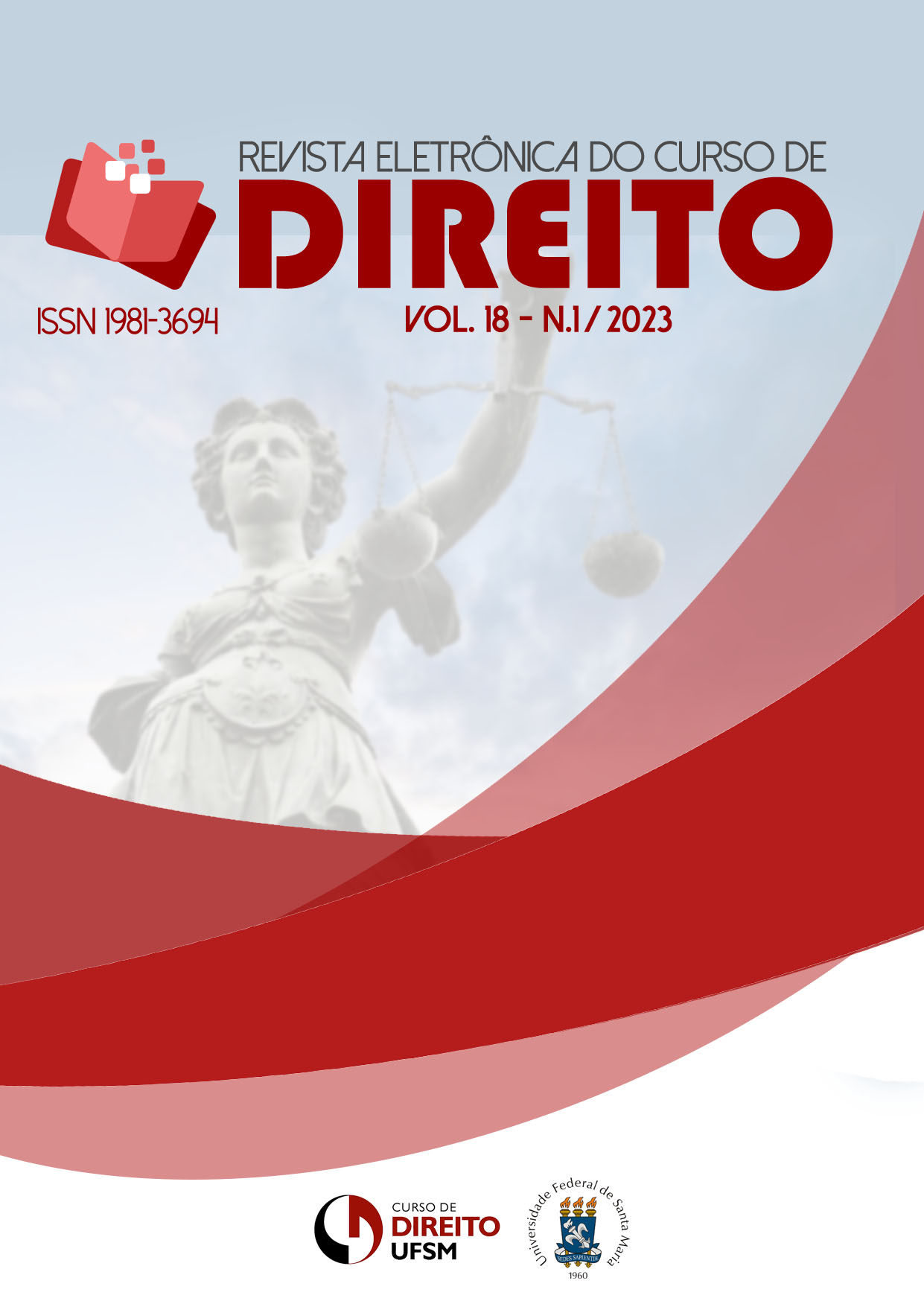O USO DA INTELIGÊNCIA ARTIFICIAL EXPLICÁVEL ENQUANTO FERRAMENTA PARA COMPREENDER DECISÕES AUTOMATIZADAS:
POSSÍVEL CAMINHO PARA AUMENTAR A LEGITIMIDADE E CONFIABILIDADE DOS MODELOS ALGORÍTMICOS?
DOI:
https://doi.org/10.5902/1981369469329Parole chiave:
deeplearning, inteligência artificial, inteligência artificial explicável, machine learningAbstract
Tendo em vista que a falta de transparência em modelos de inteligência artificial (IA) representa um risco para a sua aplicação em áreas sensíveis, este trabalho objetiva investigar a explicabilidade, que se dedica a fornecer explicações satisfatórias sobre decisões de modelos algorítmicos. A partir de uma revisão de literatura atual sobre o tema, é empreendida uma análise indutiva. Conclui-se que a inteligência artificial explicável deve ser elemento constitutivo da transparência dos sistemas de IA, uma vez que atua como importante contrapeso à opacidade, transformando “caixas-pretas” algorítmicas em “caixas de vidro”. Neste sentido, a criação de sistemas mais transparentes e interpretáveis deve ser considerada e estimulada na formulação de políticas públicas, de modo a elevar a legitimidade das decisões produzidas por sistemas inteligentes.
Downloads
Riferimenti bibliografici
AIKINS, Janice. Prototypes and production rules: a knowledge representation for computer consultations. 1980. 112 f. Tese (Doutorado em Ciência da Computação) – Departament of Computer Science, Stanford University, California. 1980. Disponível em: https://apps.dtic.mil/sti/pdfs/ADA091177.pdf. Acesso em: 17 jun. 2023.
ALVES, Marco Antônio Sousa. Cidade inteligente e governamentalidade algorítmica: liberdade e controle na era da informação. Philósophos, Goiânia, v. 23, n. 2, 2019. Disponível em: https://revistas.ufg.br/philosophos/article/view/52730. Acesso em: 17 jun. 2023.
ALVES, Marco Antônio Sousa; ANDRADE, Otávio Morato. Da “caixa-preta” à “caixa de vidro”: o uso da Explainable Artificial Intelligence (XAI) para reduzir a opacidade e enfrentar o enviesamento em modelos algorítmicos. Revista de Direito Público, Brasília, v. 18, n. 100, 2022. Disponível em: https://www.portaldeperiodicos.idp.edu.br/direitopublico/article/view/5973. Acesso em: 17 jul. 2023.
ANDRADE, Otávio Morato de. Governamentalidade algorítmica: democracia em risco? 1. ed. São Paulo: Dialética, 2022.
ARENS, Bob. Cognitive computing: under the hood. Thomson Reuters, [s.l.], Jan. 2017.
ARRIETA, Alejandro et al. Explainable Artificial Intelligence (XAI): Concepts, taxonomies, opportunities and challenges toward responsible AI. Information Fusion, [s.l.], v. 58, 2019. Disponível em: https://arxiv.org/abs/1910.10045. Acesso em: 17 jun. 2023.
BARZILAY, Regina et al. A new approach to expert system explanations. Associoation for Computational Linguistics, Canadá, v. natual language generation, 1998. Disponível em: https://aclanthology.org/W98-1409/. Acesso em: 18 jun. 2023.
BRASIL. Projeto de Lei n. 21 de 2020. Estabelece pincípios, direitos e deveres para o uso de inteligência artificial no Brasil, e dá proviências. Brasília: Câmara dos Deputados, [2020]. Disponível em: https://www.camara.leg.br/propostas-legislativas/2236340. Acesso em: 18 jun. 2023.
BURRELL, Jenna. How the machine ‘thinks’: Understanding opacity in machine learning algorithms. Big Data & Society, [s.l.], jan.–jun., 2016.
CONSELHO NACIONAL DE JUSTIÇA (CNJ). Resolução n. 332, de 21 de agosto de 2020. Dispõe sobre a ética, a transparência e a governança na produção e no uso de Inteligência Artificial no Poder Judiciário e dá outras providências. Brasília: Conselho Nacional de Justiça, [2020]. Disponível em: https://atos.cnj.jus.br/atos/detalhar/3429. Acesso em: 18 jun. 2023.
ESTEVA, Andre et al. Dermatologist-level classification of skin cancer with deep neural networks. Nature, [s.l.], n. 542, p. 115–118, 2017. Disponível em: https://pubmed.ncbi.nlm.nih.gov/28117445/. Acesso em: 18 jun. 2023.
EXPLAINING decisions made with AI. ICO - INFORMATION COMMISSIONER’S OFFICE. Londres, 2020. Disponível em: https://ico.org.uk/for-organisations/uk-gdpr-guidance-and-resources/artificial-intelligence/explaining-decisions-made-with-artificial-intelligence/. Acesso em: 18 jun. 2023.
GUNNING, David. Explainable Artificial Intelligence (XAI) DARPA/I2O. DARPA - Defense Advanced Research Projects Agency, [s.l.], 2016. Disponível em: https://www.cc.gatech.edu/~alanwags/DLAI2016/(Gunning)%20IJCAI-16%20DLAI%20WS.pdf. Acesso em: 18 jun. 2023.
HIDDEN LAYER. DeepAI, [s.l.]. Disponível em: https://deepai.org/machine-learning-glossary-and-terms/hidden-layer-machine-learning. Acesso em: 18 jun. 2023.
KERNS, Michael; ROTH, Aaron. The etichal algorithm: the science of socially aware algorithm design. Oxford University Press, 2020.
MARCUS, Gary; DAVIS, Ernest. How to build artificial intelligence we can trust. The New York Times, [s.l.], 6 de setembro de 2019. Disponível em: https://www.nytimes.com/2019/09/06/opinion/ai-explainability.html. Acesso em: 18 jun. 2023.
MOLNAR, Christoph. Interpretable machine learning: a guide for making black box models explainable. [S.l.], 2023. Disponível em: https://christophm.github.io/interpretable-ml-book/index.html. Acesso em: 18 jun. 2023.
MORAIS, Fausto Santo de. O uso da inteligência artificial na repercussão geral: desafios teóricos e éticos. Revista de Direito Público, Brasília, v. 18, n. 100, p. 306-326, 2021. Disponível em: https://www.portaldeperiodicos.idp.edu.br/direitopublico/article/view/6001/pdf. Acesso em: 18 jun. 2023.
MOROZOV, Evgeny. Big tech: a ascensão dos dados e a morte da política. São Paulo: Ubu, 2018.
NUNES, Dierle José Coelho; ANDRADE, Otávio. A explicabilidade da inteligência artificial e o devido processo tecnológico. Revista Conjur, São Paulo, 7 de julho de 2021. Disponível em: https://www.conjur.com.br/2021-jul-07/opiniao-explicabilidade-ia-devido-processo-tecnologico. Acesso em: 18 jun. 2023.
NUNES, Dierle José Coelho; MARQUES, Ana Luiza. Inteligência artificial e direito processual: vieses algorítmicos e os riscos de atribuição de função decisória às máquinas. Revista de Processo, São Paulo, v. 43, p. 421–447, nov. 2018. Disponível em: https://bd.tjdft.jus.br/jspui/handle/tjdft/43025. Acesso em: 18 jun. 2023.
OSÓRIO, Fernando. Redes Neurais - Aprendizado Artificial. Forum de I.A. [S.l.]. Disponível em: http://osorio.wait4.org/oldsite/IForumIA/fia99.pdf. Acesso em: 18 jun. 2023.
PAPANTONIS, Ioannis; BELLE, Vaishak. Principles and practice of explainable machine learning. ArXiv, [s.l.], v. 1, set. 2020. Disponível em: https://arxiv.org/pdf/2009.11698.pdf. Acesso em: 18 jun. 2023.
PREECE, Alun. Asking ‘Why’ in ai: explainability of intelligent systems – perspectives and challenges. Intelligent Systems, [s.l.], 2018. Disponível em: https://onlinelibrary.wiley.com/doi/abs/10.1002/isaf.1422. Acesso em: 18 jun. 2023.
RIBEIRO, Marco Túlio; SINGH Sameer; GUESTRIN, Carlos. “Why should i trust you?” explaining the predictions of any classifier. arXiv, [s.l.], v. 1, fev. 2016. Disponível em: https://cardiacmr.hms.harvard.edu/files/cardiacmr/files/ribeiro_et_al._arxiv_2016.pdf. Acesso em: 18 jun. 2023.
ROUVROY, Antoinette; BERNS, Thomas. Governamentalidade algorítmica e perspectivas de emancipação: o díspar como condição de individuação pela relação? Revista Eco Pós, v. 18, n. 2, p. 35-56, 2015. Disponível em: https://revistaecopos.eco.ufrj.br/eco_pos/article/view/2662. Acesso em: 18 jun. 2023.
RUSSEL, Stuart; NORVIG, Peter. Artificial intelligence: a modern approach. New Jersey: Prentice-Hall, 1995.
SILVER, David et al. Mastering the game of go without human knowledge. Nature, [s.l.], out. 2017. Disponível em: https://www.nature.com/articles/nature24270. Acesso em: 18 jun. 2023.
SURDEN, Harry. Machine learning and law. Washington Law Review, [s.l.], v. 89, N. 1, mar. 2014. Disponível em: https://digitalcommons.law.uw.edu/wlr/vol89/iss1/5/. Acesso em: 18 jun. 2023.
SUSSKIND, Richard. The end of lawyers: rethinking the nature of legal services. [S.l.]: Oxford Uniersity Press, 2010.
UNIÃO EUROPEIA. Regulamento (UE) 2016/679 do Parlamento Europeu e do Conselho de 27 de abril de 2016. Disponível em: https://eur-lex.europa.eu/legal-content/PT/TXT/?uri=uriserv%3AOJ.L_.2016.119.01.0001.01.POR&toc=OJ%3AL%3A2016%3A119%3AFULL. Acesso em: 18 jun. 2023.
VILLANI, Cédric. Donner uns sens à li’intelligence artificielle: pour une stratégie nationale et européenne. Paris, 2018. Disponível em: https://medias.vie-publique.fr/data_storage_s3/rapport/pdf/184000159.pdf. Acesso em: 18 jun. 2023.
##submission.downloads##
Pubblicato
Come citare
Fascicolo
Sezione
Licenza

Questo lavoro è fornito con la licenza Creative Commons Attribuzione - Non commerciale - Non opere derivate 4.0 Internazionale.

Este obra está licenciado com uma Licença Creative Commons Atribuição-NãoComercial-SemDerivações 4.0 Internacional.








